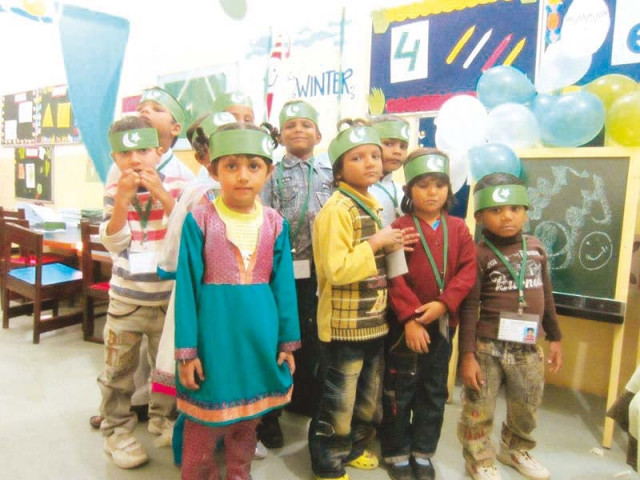From streets to schools: A class apart
The Organization hopes to get children off the streets and into classrooms

Children at the Justuju School celebrate Green Day. PHOTOS COURTESY: THE JUSTUJU WELFARE ORGANIZATION FACEBOOK PAGE
DESIGN BY SANOBER AHMED
Four years ago, Azam Basti, located near Karachi’s Phase 1 area, was described in the media as a place where “the young people are lured into all that drugs offer because they have little else to do.” A year later, in 2011, the Justuju School opened its doors to the residents of Azam Basti, offering education to the young inhabitants of this community for Rs200 per month.


(Left) Children sit at the table for lunch. (Below) Pre-primary students enjoy some storytelling.
The school is one of the main projects of the Justuju Welfare Organization, a non-government organisation (NGO) founded in 2011 with the mission of providing quality education to under-privileged children. Justuju, the Urdu word expressing ‘the ability or desire to do something’, is the fruit of the dedicated efforts of 20 young individuals, many of whom are still studying in college, who strive to give back to our society the one blessing that they had — a good education. According to Haseeb Gandhi, who started the NGO, “As I was blessed with opportunities during my academic journey, I understand their importance and want these children to be able to have the same chance I had. This is my remuneration to a society which has blessed me with a good life.” The school currently runs classes from Nursery to Grade 3 at the moment, but is adding classes every year and hopes to have a Grade 4 by next year. Justuju operates through the donations of friends, family members and various well-wishers.



(Top-right) Learning is made fun with several activities at the Justuju School. (Bottom-right)High achievers are awarded prizes during the parent-teacher meeting. (Below) Members of the Justuju Welfare Organisation with students.
The achievements of the Justuju School can be clearly seen in the dramatic change to its students’ lives. Abdullah, a daily-wage labourer with a meager income, is a resident of Azam Basti along with his family of six. He did not expect to ever send his children to school or provide them with a solid educational foundation. However, today, his four-year-old daughter Rida* has risen to the top of her class at the Justuju School, and she is known for her punctuality and excellent memory.
Before five-year-old Ishaaq joined the school, his mother was increasingly concerned by his aggressive behaviour. However, she believes today that once the school encouraged him to explore his imagination and creative side, he began exhibiting the nature his parents had hoped for; his mother describes him as well-groomed, with a soft spot for animals and a strong desire to become a vet. Meanwhile, ‘Naughty Kamil’, as his teachers call him, used to believe that his dream of being a fighter pilot was just that — a dream. After three years at the Justuju School, he is perhaps the most motivated and hard-working student there.

Each child puts their bag in the section displaying their respective symbol.
These are the stories of only a handful of children with enormous potential, but cultivating their abilities has been an uphill task. According to Yusra Rasheed, head of Academics at the school, the greatest challenge Justuju faced was a lack of admissions. “Since people did not know about the school, we only had 35 students when we first started. Today, in our third academic year, we have received roughly 200 applications for admission within three days.” Rasheed believes parents are drawn to the school because of the excellent reputation it has developed in the neighbourhood over the years.
Hiring good teachers was also a daunting task. It took a while to find good teachers who were willing to come to the neighbourhood and teach the children living here, but today the NGO employs 15 teachers. Rasheed explains, “We chose to set up this school in Azam Basti as the children here belonged to the social strata we were hoping to target — low income groups, and men and women who work as maids or drivers but who are unable to provide their children with quality education due to financial constraints.” It was the cycle of few employment opportunities and lack of education that the Justuju team wished to break in Azam Basti.

For the students, the school is a welcome relief. “I love painting and playing with friends here,” says 7-year-old Aliya*, a student at the school. “I love wearing the Justuju uniform!” For Aliya, homework is not a chore. “I have to help my mother at home, but I have grown to love school so much that I always manage to find time for my studies.” The Justuju team has also created an environment where children are eager to spend their time. Four-year-old Lenny* explains, “I thought grown-ups were people who yelled at you and were angry all the time. But then I came here to Justuju and everyone is so nice; I want to come here every day.”

Teachers conduct a group activity for students.
The Justuju team believes that they have been helped by their own project, just as the neighbourhood has benefited from their presence. “The school benefits those who run it as it offers them a much-needed outlet for their determination to improve Pakistani society. And it shows the rest of the society that anything is possible, no matter how old you are or what situation you find yourself in,” explains Rasheed.
*Names have been changed to protect privacy.
Butool Hisam is a medical student at DOW Medical College, Karachi, and a blogger.
Published in The Express Tribune, Sunday Magazine, April 26th, 2015.



















COMMENTS
Comments are moderated and generally will be posted if they are on-topic and not abusive.
For more information, please see our Comments FAQ